Excision is routine work in primary care, but deciding who should wield the scalpel isn’t always...
.jpg?height=200&name=HCE%20HubSpot%20blog%20images%20600x350%20(22).jpg)
Acquire and hone various skin cancer surgical techniques, including large elliptical excision, flaps, and grafts.
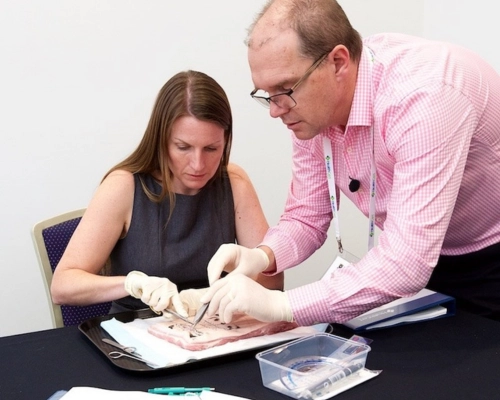
Surgery is still considered the most effective and definitive skin cancer treatment. This certificate course will allow you to manage more complex skin cancer cases in your practice.
- This course is perfect for practitioners with some prior skin cancer training or experience.
- Learn various techniques allowing treatment of more complex cases in the primary care setting.
- This course is for physicians only.
- CPD-accredited and university-assured.
Fulfils 50 hrs for medical professionals in Australia*
100% online
Online + workshop
Fully online: $2595
Online + workshop: from $3695
Special rates available
70.5 hrs
Self-paced
2026
21 March in Brisbane
18 April in Sydney
16 May in Melbourne
1 August in Brisbane
19 September in Sydney
17 October in Melbourne
*provided an outcome measurement activity with a minimum of 5 hours is completed.
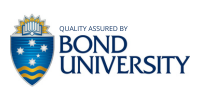
- Perfect your elliptical excisions and suturing techniques for accurate removal of lesions and closure of wounds.
- Administer local anaesthesia effectively and ensure patient comfort during procedures.
- Understand the principles of flaps and grafts to perform surgeries in sensitive areas.
- Learn about pivotal, rhomboid, and advancement flaps as part of your surgical options.
- Reduce post-operative complications and promote healing through effective wound care.
- Learn important surgical techniques in the management of skin cancer to provide effective treatments to patients in primary care, without the need for referral to specialists.
- Enjoy an interactive, hands-on program with immediate applicability, and gain the confidence to surgically treat skin lesions in your practice.
Get unlimited access to all course content, additional learning materials, ongoing post-course support, and more.
This module focuses on the theory and anatomical considerations relating to basic skin cancer surgery. This module outlines the clinical requirements including how to set up the procedure room, surgical instruments and other equipment and supplies. The module incorporates skin anatomy and skin tension lines when considering the position and direction of an ellipse. The principles of, and how to do an ellipse are covered including undermining, haemostasis, suturing, dressings and aftercare. The suturing section incorporates the various types of sutures and needles. Skin anatomy and significant nerves are discussing including symptoms of damaged nerves. The later part of the module covers the importance of taking photos, procedural notes and patient consent.
This module focuses on skin cancer surgery relating to suturing, perfecting the ellipse and local anaesthtic. Participants will learn about various suturing techniques, how to design and plan elliptical excisions, and administer local anaesthesia. The module builds on the foundation knowledge of skin cancer surgery. This includes essential skills in knot tying, administering local anaesthetic, the role of diathermy/electrosurgery, surgical margins, instruments and surgery preparation. It then goes through the planning and design of an ellipse that includes cleaning the pork belly, loading a scalpel blade, marking out, excising and undermining an ellipse. The various common sutures are demonstrated including interrupted, deep, vertical mattress, horizontal mattress, pulley, marini and running sutures. Descriptions are provided on what each suture option is used for, to determine the best sutures for closing a particular wound.
This course focuses on skin grafting for skin cancer surgery. It introduces the skin graft technique, explains the difference between full thickness and split skin grafts, how they work, and the stages of graft survival. The rationale for choosing the most appropriate skin graft when performing skin cancer surgery is outlined. The module takes a step by step approach from excising the tumour to harvesting and closing the donor tissue site. Suitable techniques for suturing the donor tissue into the defect are discussed. Surgery preparation including patient considerations and maximising the wound environment for skin healing. The module includes how to plan skin grafts based on the size of the defects, the donor area and preserving tissue during the procedure. Depending on the type of lesion, information is provided on when to perform a skin graft as opposed to wedge excision on the ear.
This module focuses on skin cancer surgery relating to pivotal flaps. Participants will learn the theory and principles of pivotal flaps supported by practical demonstrations on pork belly. The fundamentals are discussed including what is a skin flap, options for closure and aesthetic considerations. Potential complications are outlined. In the practical planning section, the design of rotation flaps including graphical images, assist with the planning of rotation flaps. The primary movement is for the flap to rotate into the defect with a leading edge, whilst the secondary movement is the arc defect resulting as an effect of the primary intention. With rotation flaps, dog ears are likely and techniques to remove dog ears are included. Degrees of rotation limitations are mentioned. Both schematic and clinical images assist with understanding rotation flap principles. Information on suture approach and placement are outlined for the rotation flap defect. Clinical cases are featured throughout the module.
This module focuses on skin cancer surgery relating to rhomboid flaps part 1. Participants will learn the theory and principles of rhomboid flaps supported by practical demonstrations on pork belly. The fundamentals are discussed including what is a skin flap, options for closure and aesthetic considerations. The importance of appropriate undermining is detailed. Careful patient evaluation, design planning and skilful meticulous technique are critical in minimising complications. In the practical planning section, the schematics of rhomboid flaps including graphical images, assists with the planning of rhomboid flaps. The primary movement is the transposing of the flap tissue over and into the defect, while the secondary movement is the donor or adjacent tissue defect created as a result of the primary transposition. With rhomboid flaps, dog ears are likely and techniques to remove dog ears are included. Both schematic and clinical images assist with understanding rhomboid flap principles. Information on suture approach and placement are outlined for the rhomboid flap defect. Modified rhomboid flaps are introduced.
This module focuses on skin cancer surgery relating to advancement flaps part 1. Participants will learn about these flaps including variations such as single and helical advancement, A-T, H-plasty and lateral advancement. Selecting the type of flap depends on the location of the defect and optimising aesthetic outcomes. Clinical case images demonstrate the marking out and planning of advancement flaps considering skin tension lines and then closing the wound. Unit two discusses the mathematic rules applied to advancement flaps. It includes practical demonstrations of advancement flaps using pork belly including undermining and outlining the suturing approach. Several advancement flap variants are also demonstrated on pork belly.
This module focuses on skin cancer surgery relating to wound care and managing complications. Participants will learn the phases of wound healing and how this relates to skin cancer surgery procedures. The various types of wound dressings are outlined including what dressings are used for a particular type of wound. Information on the use of antibiotic medications, movement whilst wounds are healing and considerations of when to remove sutures are outlined. Resources that can be applied for clinical use are provided. Unit two outlines what to do to manage complications that may occur. These include bleeding, haematoma, dehiscence, infection, splitting sutures, hypertrophic and keloid scarring and hypergranulation. Unit three introduces Mohs surgery, explains its application for pathology and its relevance to skin cancer surgery. Unit four discusses Medicare Australia and remuneration for skin cancer surgery procedures. Unit five outlines the medico legal considerations in Australia and the role of medical insurance.
This module focuses on case studies relating to skin cancer surgery. Participants will have an interactive opportunity to receive expert feedback on planning skin cancer surgery. A recording is presented for each of the six case studies describing the patient and the lesion that requires skin cancer surgery. Participants are asked to draw their surgery plans for each case including margins, and consider specific issues that may relate to that surgery or suggest other treatment options. A template guide is provided for each case.
*These topics are covered during the hands-on practical sessions in the optional skills workshop.
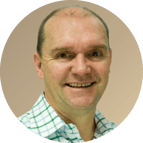
Associate Professor (Skin Cancer) & Course Coordinator MMed (Skin Cancer), The University of Queensland
Associate Professor Tony Dicker has practised full-time Skin Cancer Medicine in Melbourne since 2004, and previously practised in Brisbane. He obtained his PhD from The University of Queensland in molecular biology of skin cancer with Professor Ian Frazer's group at Princess Alexandra Hospital. He then spent three years as a dermatology registrar at the Royal Brisbane and Princess Alexandra Hospitals.

Certificate in Advanced Dermoscopy & Digital Imaging, The University of Queensland
Doctor, National Skin Cancer Centres, Coorparoo
Dr Francis Tan graduated from The University of New South Wales in 1986. He worked in a variety of general practice surgeries throughout Australia, including clinics in Sydney, Tweed Heads, the Gold Coast, Brisbane and Cairns. He now practises at the Coorparoo Skin Cancer Centre in Brisbane.
Francis obtained a Masters of Medicine from The University of Queensland in 2014 and holds an impressive portfolio of university-certified Professional Diplomas in Skin Cancer Medicine and related fields. He is particularly interested in using dermatoscopy to detect melanoma in situ and performing skin cancer surgery to the best of his ability for the benefit of his patients.
from $2595
*provided an outcome measurement activity with a minimum of 5 hours is completed.
Bundle two courses and save 5%, or three courses and save 10% upon enrolment. Talk to us about deferred payment options, registrar scholarships and special rates.
*For Australian residents only: Online course prices are shown exclusive of GST. If you are GST-registered, please enter a valid ABN at checkout to ensure GST is not applied. Otherwise, 10% GST will be added at checkout. View our FAQ for more information.
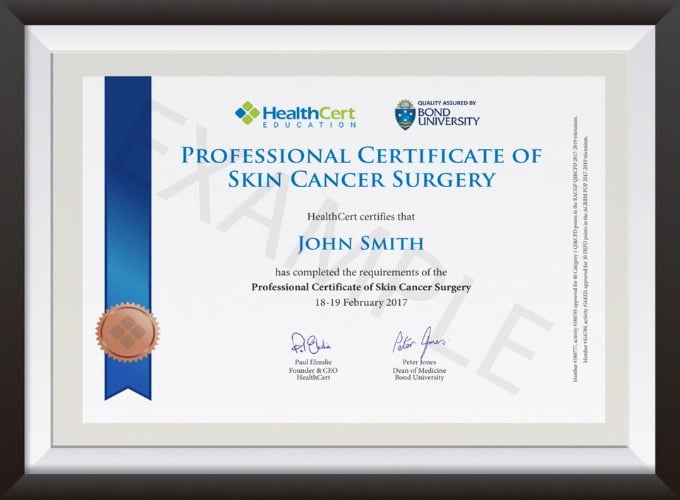

Every GP should attend this course to know the basics of skin cancer surgery. It was a very important platform for learning - everything was well thought out and well organised.
Dr B. Roy
Interactive and hands-on. I feel much more confident with more difficult excisions.
Dr E. Kirkpatrick
Anyone interested in skin cancer medicine would benefit from solidifying the basics and learning the principles of more advanced flaps that were taught.
Dr H. Kim
Fun learning and very practical. I was able to go at my own pace and can take the learning immediately into treating patients.
Dr R. Harman
This is a brilliant course - enjoyable and extremely well organised with good speakers and lectures, and friendly and efficient staff. This course added immensely to my skin cancer surgery knowledge.
Dr A. Du Plessis
| RACGP Activity Number | ACRRM Activity Number | Activity Title | Education Hours | Performance Hours | Outcome Hours | ||
|---|---|---|---|---|---|---|---|
| 402747 | 28423 | Rhombus Flaps | 402747 | 28423 | 3.5 | 5 | 0 |
| 402744 | 28422 | Pivotal Flaps (Rotation flaps) | 402744 | 28422 | 3.5 | 5 | 0 |
| 403429 | 28426 | Case Studies | 403429 | 28426 | 0 | 7.5 | 0 |
| 402742 | 28421 | Skin Grafting and Principles of Flaps | 402742 | 28421 | 3.5 | 5 | 0 |
| 402753 | 28425 | Wound Care and Managing Complications | 402753 | 28425 | 4 | 5 | 0 |
| 402751 | 28424 | Advancement Flaps | 402751 | 28424 | 4 | 5 | 0 |
| 402535 | 28419 | Theory, Anatomy and Principles of Skin Cancer Surgery | 402535 | 28419 | 4.5 | 5 | 0 |
| 402741 | 28420 | Suturing, Perfecting the Ellipse and Local Anaesthetic | 402741 | 28420 | 5 | 5 | 0 |
| 800462 | 32975 | Theory, Anatomy and Principles of Surgery Outcome Improvement Activity | 800462 | 32975 | 0 | 0 | 8.5 |
| Total hours | 28 | 42.5 | 8.5 | ||||
The optional Skin Cancer Surgery Practical Workshop is accredited for 8.5 CPD hours total.
Education hours: 1
Performance hours: 7.5
The purpose of outcome measurement activities is to improve your clinical confidence in managing an identified learning gap. Outcome measurement activities are not a requirement of our Professional Certificate of Advanced Certificate courses; they are a requirement for Australian CPD purposes.
HealthCert Education provides a variety of outcome measurements activities to suit your needs:
The Professional Certificate of Skin Cancer Surgery is suitable for physicians only. HealthCert recommends that participants have some exposure to or previous training in skin cancer management before enrolling in this course.
Participants do not have to pass an IELTS test but, as the courses are delivered in English, proficiency in listening, reading and writing in English is assumed.
Participants will require access to a computer/laptop, an internet connection and a basic level of technology proficiency to access and navigate the online learning portal.
Professionally recognised qualifications and prior studies may be recognised for entry into this course if the learning outcomes match exactly. Please ask a HealthCert Education Advisor for an individual assessment of your prior qualifications and experience.
This certificate course meets the minimum 50 hours CPD annual requirement across all three mandatory CPD activity types, provided an outcome measurement activity with a minimum of five hours is completed. You may use an optional HealthCert outcome measurement activity or develop your own.
Outcome measurement activities are not a requirement of Professional or Advanced Certificates.
Upon successful completion of the course requirements, course participants will receive the Professional Certificate of Skin Cancer Surgery and CPD hours. (Participants who choose to complete the online course components only (no workshop) will receive the Professional Certificate of Skin Cancer Surgery Principles.)
To learn more about the delivery of certificates in Australia and overseas, please visit our FAQs.
Professional Diploma Pathway
This course is the first stage of the Professional Diploma pathway. The full pathway is Professional Certificate of Skin Cancer Surgery, Advanced Certificate of Skin Cancer Surgery, and Professional Diploma of Skin Cancer Surgery.
RPL with The University of Queensland
Master of Medicine (Skin Cancer)
Doctors who complete the HealthCert Professional Diploma programs in Dermoscopy, Skin Cancer Medicine, and Skin Cancer Surgery will receive RPL for the units IMED7002, IMED7010, and IMED7011, which are high-level subjects in the Master of Medicine (Skin Cancer) at The University of Queensland. The Master of Medicine is open only to registered medical practitioners with at least two years' postgraduate experience. View The University of Queensland Master of Medicine (Skin Cancer) program.
Please note, only HealthCert Education qualifications completed within the last ten years can be recognised.
Postgraduate Diploma in Minor Surgery (UK)
The Postgraduate Diploma in Minor Surgery is studied through the Rila Institute of Health Sciences and awarded by the University of Plymouth (UK).
There are three modules in the Postgraduate Diploma. Medical professionals who successfully complete the HealthCert Professional Certificate of Skin Cancer Surgery, Advanced Certificate of Skin Cancer Surgery and Professional Diploma of Skin Cancer Surgery will be eligible to apply for Accreditation of Prior Certified Learning (APCL) for module 3.
The Postgraduate Diploma is mainly delivered online. No practical workshops will be required due to the APCL from the HealthCert qualifications. Overall there will be a time saving of 40 per cent of the postgraduate program due to the APCL. Exams will be held in Perth, Western Australia.
When the Postgraduate Diploma has been successfully completed, doctors can apply for credit from the Postgraduate Diploma to the Master of Science in the Specialism awarded by the University of Plymouth.
Certified Clinical Attachments Pathway
Clinical attachments are optional and available on a 1:1 or small group basis. These provide the opportunity to observe skin cancer surgery and ask questions of the expert performing the procedures. In addition to clinical attachments in Australia, university teaching hospitals at the University of Lyon and the University of Vienna are available for clinical attachments. HealthCert certificates and university statements are awarded for participating in clinical attachments.
The dominant areas of study covered by The Université Claude Bernard Lyon 1 are science and medicine. Attached to the university are the "Hospices civils de Lyon" including the "Centre Hospitalier Lyon Sud", which is the largest teaching hospital in the Rhône-Alpes region and second largest in France. Out of the 2,630 faculty, 700 are also medical practitioners at local teaching hospitals.
The Medical University of Vienna is the largest medical
This organisation is an RACGP-accredited CPD provider under the RACGP CPD Program.



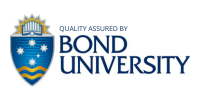

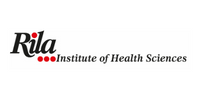
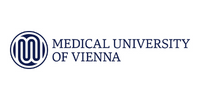
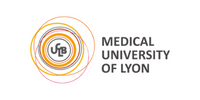

Don't see your question? Explore other faqs or talk to us.
Fees will vary based on the program and study option selected (fully online vs online + optional practical workshop). Payments can be made upfront or in monthly instalments. Special rates and various payment options are available. GP registrars and doctors in training enjoy a scholarship of up to $500. Talk to us to learn more.
Completion of any HealthCert course or attendance at an event will enable you to access the HealthCert Alumni Program which includes:
HealthCert Education is pleased to issue digital credentials for alumni. Digital credentials are a permanent online record of your successful completion of a HealthCert course and are issued to all course participants in addition to PDF certificates. If you are based in Australia, you also have the option to order a hard copy of your digital certificate for a small additional fee.
The recommended study duration of this certificate course is 70.5 hours, which includes study of the pre-course activities and readings, online lectures, live tutorials, and online assessment. This self-paced course offers the flexibility of 100% online study in your own time, at your own pace, in your own home or office, with no mandatory face-to-face requirements. You are not required to be online at specific times but can view and replay video lectures at your convenience.
All HealthCert courses meet World Federation of Medical Education standards. This certificate course qualifies for CPD hours from the Royal Australian College of General Practitioners (RACGP) and the Australian College of Rural and Remote Medicine (ACRRM) in Australia. It is recognised by the Royal New Zealand College of General Practitioners (RNZCGP) in New Zealand. It is recognised by the Hong Kong College of Family Physicians (HKCFP) in China. It is a self-submitted activity in Dubai and the United Kingdom. It is a self-submitted activity through the College of Family Physicians in Canada. If you live or work outside one of the above-mentioned countries, please contact us on admin@healthcert.com to discuss whether this course can be recognised in your country.
Want to stay up-to-date with the latest case studies, podcasts, free video tutorials and medical research articles pertinent to primary care?
Our Education Advisors can assist you with any queries and tailor our education pathway to suit your current expertise, interests and career goals.